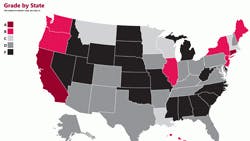Expecting Better: Report Claims New Parents Need More Workplace Protections
The report, "Expecting Better: A State-by-State Analysis of Laws that Help New Parents," graded all 50 states and the District of Columbia based on the enactment of select laws that expand upon federal leave and workplace protections. The report found that no state is doing all it could to support new parents.
Only California and Connecticut received grades as high as an A-. Eight states earned a grade of B; seven states earned a grade of C; and 14 states earned a grade of D. Eighteen states received failing grades for having enacted no leave or other workplace policies at all to help new parents who are in the workforce, beyond the protections provided by federal law.
"The birth of a child should be a joyous event for new mothers and fathers, not the cause of financial hardship or devastation," said National Partnership President Debra L. Ness. "Sadly, as this report shows, tens of millions of working parents throughout the country have no access to paid leave when a child is born and few if any other workplace protections beyond the minimum standards set by federal law. At a time when the majority of women are both caregivers and breadwinners, America's families expect and deserve much better."
Women now make up nearly half of the work force in the United States, and 71 percent of U.S. children live in families where all parents work. More than 4 million U.S. women gave birth in the 2009-2010 year alone (the most recent data available). Without access to some wages and job security, these workers and families often have no choice but to sacrifice much-needed income or their jobs when a new child arrives. This causes them to risk both their economic security and their health.
The Importance of Paid Leave
Past research, including recent studies commissioned by the National Partnership, shows that paid leave promotes the health and economic security of families, reduces reliance on public assistance programs and benefits businesses through improved worker loyalty and reduced turnover. Despite these benefits, the report found that no state has done all it could to provide paid family and medical leave and other supportive policies for new parents.
"Some states are doing better for new parents than others," explained Ness, "but most have a long way to go to fully protect the economic security and health of working families – and it is well documented that it is in their interest to do so."
Currently, only California and New Jersey have paid leave insurance programs that guarantee workers access to the time they need when a new child arrives or a family member needs care. Some members of Congress are working on a proposal for a national paid leave insurance program, which would establish a national standard and greatly increase access to paid leave for America's families.
The United States is one of few countries in the world that does not guarantee its citizens access to paid leave. Paid leave for new mothers is guaranteed in 178 other nations, and 54 nations guarantee paid leave for new fathers. The federal Family and Medical Leave Act (FMLA), enacted nearly 20 years ago, provides new parents up to 12 weeks of unpaid leave, but only about half of the work force is eligible and many cannot afford to take the unpaid leave it provides.
The analysis was conducted by the National Partnership for Women & Families. The full report is available at http://www.nationalpartnership.org/ExpectingBetter.
About the Author

Laura Walter
Laura Walter was formerly senior editor of EHS Today. She is a subject matter expert in EHS compliance and government issues and has covered a variety of topics relating to occupational safety and health. Her writing has earned awards from the American Society of Business Publication Editors (ASBPE), the Trade Association Business Publications International (TABPI) and APEX Awards for Publication Excellence. Her debut novel, Body of Stars (Dutton) was published in 2021.
